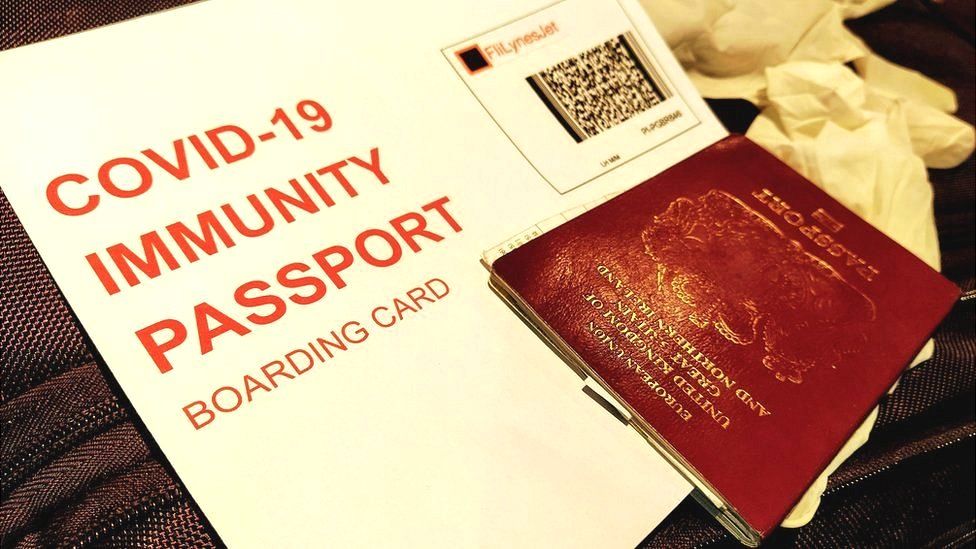Sarah Quayyum, Rebecca Babcock
Since March 2020, there has been an unprecedented decline in the amount of domestic and international travel. With the emergence of a global infectious disease outbreak (i.e. COVID-19), travel and tourism sectors the world over have suffered from massive decreases in demand. In the past year, restrictions were placed in many countries. New Zealand banned all international travel into the country. In December, with the news of a new variant of the COVID-19 virus, Canada put into place a temporary restriction of travel into the country from the United Kingdom. Presently, over 7 billion people have been impacted by travel and social restrictions to curb the spread of the virus. As the COVID-19 pandemic enters its second year, many governments and travel industry companies have turned to technological responses to continue to keep the world moving. One such proposed solution is the implementation of digital health passports.
What are Digital Health Passports?
At a basic level, a digital health passport is a phone application (“app”) or online certification which provides a traveller’s health information. Digital health passports can function in two main ways: (1) they can provide information surrounding immunity through a lab test of immune response or immunizing event; or (2) provide information on whether a person is infected. It is a modernized tool of health certification. An individual would download an app on their phone, connect it to their travel provider or destination country, and then input their required verifications. Users may receive a QR code or other form of verification that they are eligible to travel. Currently, some digital health passports exist: Coronapass, Commonpass, and V-Health, among others. Digital health passports are intended to balance the re-opening of the economy through passenger movement with the core public health function of outbreak management. Digital health passports have been promoted as a viable means to see who may enter a country, though their use may potentially extend to entry into retail and workplaces, and even concerts. The benefits are tangible: it could allow individuals to travel, return to work, and connect with their loved ones.

(Photo/Forbes)
Practical issues of digital health passports
Despite the practicality and efficacy of digital health passports, there remains major issues to their adoption as an innovative solution to permit travel during the COVID-19 pandemic. Foremost, research develops and changes every day with regards to the SARS-CoV-2 virus. There still remains much that is unknown about its physiological functions. One such uncertainty is the length of antibody response. There is still work being conducted with regards to the length and degree of immunity that naturally acquired antibodies and vaccines acquired antibodies may provide. Additionally, it remains unclear whether those with antibodies may still pass the virus onto others without immunity. Largely, COVID-19 immune response remains a mystery. It may be premature to design an identity system without understanding the full extent of the problem upon which it is based.
The pandemic has also shone light on the difficulty of regulating human social behaviour when requiring adherence to public health measures. Individuals refusing to wear masks or continuing to partake in large social gatherings despite government instructions to do so may provide insight into the issues immunity passports may cause. It has been hypothesized that those who hold such passports may use it as an opportunity to flaunt public health measures. Combined with the lack of substantive knowledge surrounding COVID-19 immunity, it may permit for risky behaviour.
The ethical dilemma

(Photo/BBC)
There also has been criticism surrounding the implementation of immunity passports in relation to the social risks it creates, namely relating to privacy and marginalization.
Privacy
Foremost, digital health passports may potentially collect information about where and when a person has traveled, or otherwise “passed through doors.” The coupling of sensitive personal health information with this location-history based system that is then amalgamated into central databases may be a step towards “digital national identification” or a wider digital monitoring system of individuals. There have been concerns about the potential for wider use of immunity passports should they be successful. For instance, they may start to include other personal information, such as criminal history, immigration status, or precarious health concerns. The storage of COVID-19 status, and potentially other personal health information in a digital format, such as a cellphone or database, presents the risk of wide-scale data breaches, as is the case of any health information digitization. This is already a present issue, as a survey of 65 digital health certificate apps found that 82% had inadequate privacy policies, and asked for “intrusive amounts of data.”
Advocates also have raised concerns that digital health or immunity passports will provide police with a greater amount of power, or may lead to a police state. Digital health passports may provide police with the ability to know more about an individual’s health alongside giving them the power to stop people in order to ask for their health status. These concerns are not without basis, as internal Fido documents on immunity passports stated that they should be recognizable to law enforcement and other agencies. Digital health passports open up further risks for breaches of privacy when discussing law enforcement. For example, if digital passports are phone-based, there are major concerns raised with the potential for abuse when providing police access to an unlocked phone.
Marginalization
Illness and health status have great potential for stigmatization, an issue that some populations have faced since the onset of COVID-19 as a pandemic.There is a substantive amount of literature that vulnerable populations, such as the racialized or low-income groups are more likely to contract COVID-19. Advocates, therefore, have argued that digital health or immunity passports may exacerbate current inequities faced by these groups, such as police violence, precarious employment and lack of access to services as a result of their health status. There has also been evidence that in the United States, white people are more likely to have access to the COVID-19 vaccine than Black people, despite its impact on racialized populations. If digital health passports focus on immunity, and there is evidence that certain groups are less likely to receive the vaccine, this will only further the health divide more. Additionally, a digital-based platform may prevent those who cannot afford smartphones from engaging with these apps and from partaking in the freedoms these apps can offer.
Ultimately, advocates are concerned that widespread use of a health certification system may create a “two-tiered system”, made of one group of the privileged who may freely continue in society, and another whose movements and participation will be heavily restricted and placed under surveillance.
Final Thoughts
We at the DGHH Lab have identified similar risks associated with Digital Contact Tracing apps and these apps have been implemented worldwide, arguably without a proper risk-benefit analysis nor appropriate processes in place to mitigate the risks and amplify the benefits. While many people are itching to start traveling, whether to visit loved ones or to experience new things, the numerous real and potential risks associated with digital health passports must be thoroughly identified and considered alongside the potential benefits in order to determine if digital health passports should be implemented. And if they are implemented, there should be corresponding regulations protecting individuals – particularly those of vulnerable and marginalized communities – so that their rights are not further at risk of being breached.

